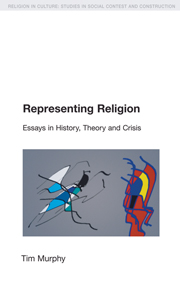Book contents
- Frontmatter
- Dedication
- Contents
- Acknowledgements
- Chapter 1 The “Crisis of Representation” and the Academic Study of Religion
- Part I Phenomenology, Consciousness, Essence: Critical Surveys of the History of the Study of Religion
- Chapter 2 “Individual Men in their Solitude”: A Critique of William James' Individualistic Approach to Religion in The Varieties of Religious Experience
- Chapter 3 The Concept of “Essence-and-Manifestation” in the History of the Study of Religion
- Chapter 4 The Concept of “Development” in Continental Geisteswissenschaft and Religionswissenschaft: Before and After Darwin
- Chapter 5 The “Transcendental Pretense” and Eliade's Humanist Hermeneutics
- Part II Towards a Nietzschean Semiotics of Religion
- Notes
- Bibliography
- Index of Subjects
- Index of Names
Chapter 4 - The Concept of “Development” in Continental Geisteswissenschaft and Religionswissenschaft: Before and After Darwin
from Part I - Phenomenology, Consciousness, Essence: Critical Surveys of the History of the Study of Religion
- Frontmatter
- Dedication
- Contents
- Acknowledgements
- Chapter 1 The “Crisis of Representation” and the Academic Study of Religion
- Part I Phenomenology, Consciousness, Essence: Critical Surveys of the History of the Study of Religion
- Chapter 2 “Individual Men in their Solitude”: A Critique of William James' Individualistic Approach to Religion in The Varieties of Religious Experience
- Chapter 3 The Concept of “Essence-and-Manifestation” in the History of the Study of Religion
- Chapter 4 The Concept of “Development” in Continental Geisteswissenschaft and Religionswissenschaft: Before and After Darwin
- Chapter 5 The “Transcendental Pretense” and Eliade's Humanist Hermeneutics
- Part II Towards a Nietzschean Semiotics of Religion
- Notes
- Bibliography
- Index of Subjects
- Index of Names
Summary
Prologue: The Politics of “Prima”
“What may count as nature for late industrial people?” (Haraway 1989, 1). With this question Donna Haraway lays bare how the rhetorical structures of natural science belie a series of hierarchical value-assumptions about the relationship between “man” and “nature.” Her specific object of analysis is the putative science of primatology. Rather than a valueneutral scientific discourse created on a positivistic (and liberal-humanist) model of objectivity, Haraway found in primatology a coded political discourse: “primatology is about an Order, a taxonomic and therefore political order that works by the negotiation of boundaries achieved through the ordering of differences” (Haraway 1989, 9). We saw before how Roland Barthes had noted the ideological implications of a taxonomic system: “the taxonomic option implies an ideological one: there is always a stake in where things are placed: tell me how you classify and I'll tell you who you are”; “we must insist on the active, transitive, programmatic, operational nature of these [taxonomic] divisions: it is not a question of the elements of a [given] structure, but of the actions of a gradual structuration” (1988, 50 and 47). “Science,” under the aegis of ontotheology, is an order, a structuration, of the relation between nature and its other.
Applied to Religious Studies, the initial question must be changed: it is not so much a matter of what counts as nature as it is who counts as nature.
- Type
- Chapter
- Information
- Representing ReligionEssays in History, Theory and Crisis, pp. 78 - 96Publisher: Acumen PublishingPrint publication year: 2007



